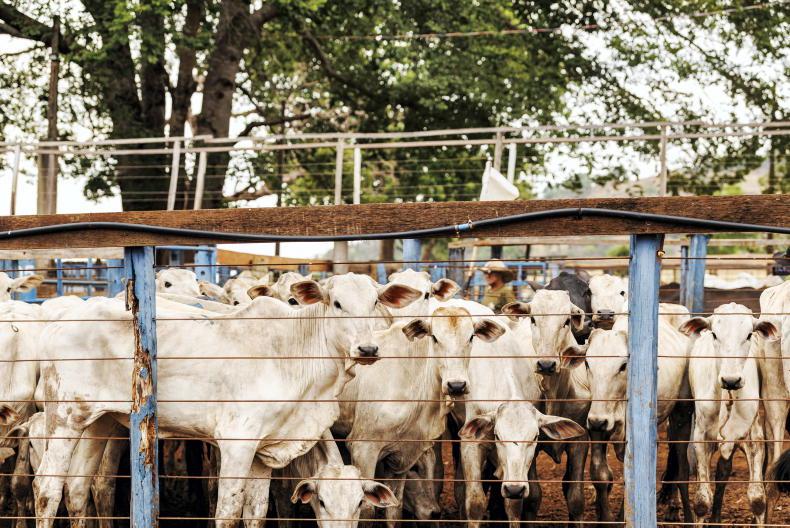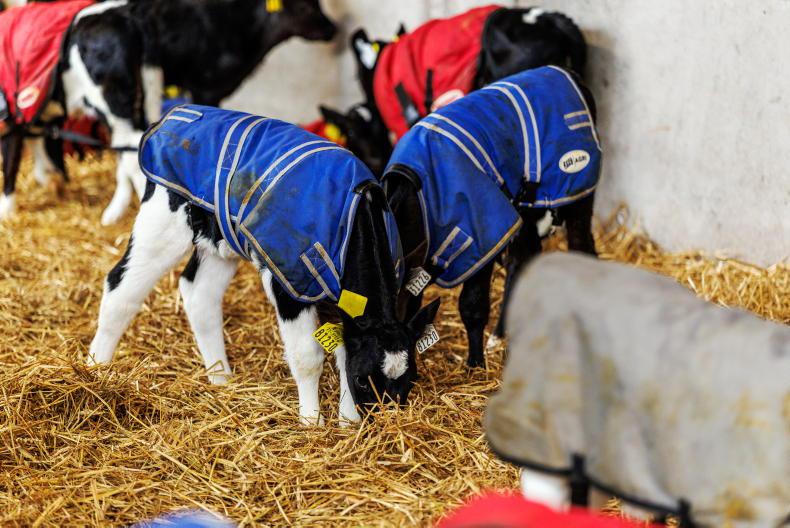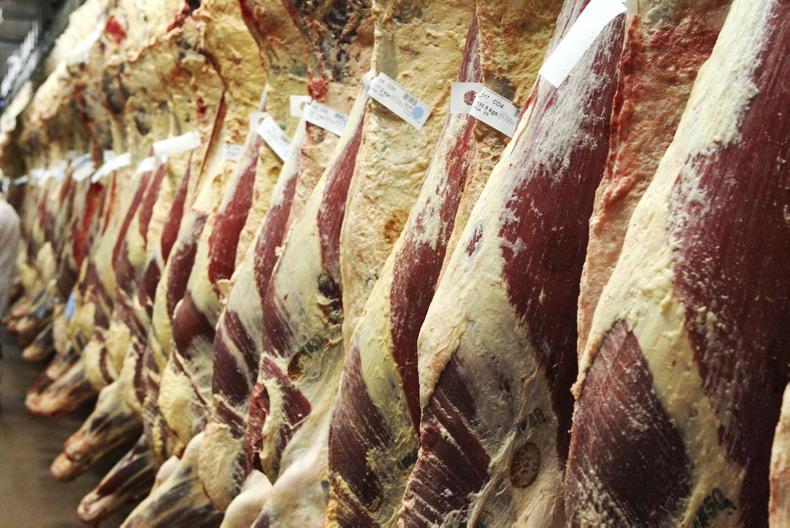The annual Dairy-Tech conference took place in the prestigious Stonleigh Park, England, historically known as the National Agricultural Centre. Dairy farmers from across the UK were in attendance, with technology ranging from measuring rumination through to fertiliser efficiency on display. Ireland was well represented, with 18 Irish companies in attendance, displaying their range of products and services to their UK client base.

The Collinson Feed Alert can be viewed through an easy to use app.
Collinson is the largest supplier of feed silos in the UK, accounting for approximately 80% of the market. While windows on the side of the silos provided farmers with some gauge as to the amount of feed remaining, they are an imperfect view regarding the level of feed remaining.
While Collinson had fitted weigh cells under the legs of silos, these were a costly option. It has now installed similar technology to weigh cells on the legs of silos which measures the stress the legs are under, as opposed to the weight. The technology is calibrated when the silo is empty and full to accurately gauge the weight of the feed remaining. As temperature affects the stress on the steel legs, readings are taken at 11.30pm every night.
Farmers can then choose a digital clock display near the base of the silo for £550 plus VAT, or opt for the information to be sent to a mobile phone app, which costs £450 plus VAT, with a $4.50/month charge on the app. Here, farmers can monitor feed levels as well as share this information with their suppliers. Suppliers can then plan their routes among several farmers to reduce delivery miles and emissions.

Wolfenden Concrete Ltd has created a hybrid slat which is fitted with 40mm rubber inserts from Easifix.
Wolfenden Concrete Ltd has developed a hybrid mat to gain the benefits of both bare concrete slats and rubber matting. In scraped passages, bare concrete slats are primarily used, as tracking cannot be fitted to rubber matting. The slat company has created a rubber insert, sourced from Easifix, to place in the specially manufactured concrete slat. The 40mm insert is grooved to drain urine away quickly to reduce ammonia emissions and keep the surface of the slats drier and cleaner.
The ratio of concrete to rubber on the slat surface is approximately 50:50, while the rubbers can be removed and replaced separate to the slat if required. The slats are available in 15ft and 17ft lengths as standard, with other sizes made to order.

Vendig is a total solutions company for dairy farmers looking to sell directly to consumers, with pasteurisers, bottling plants and vending machines available.
Farm shops and farm vending machines have grown massively in popularity in the UK, as farmers seek to bridge the gap between farm gate price and consumer price.
Vendig is a UK-based company that handles all areas regarding establishing a farm vending machine, from milk pasteurisers through to supplying and fitting the vending machine itself.
The company focuses on dairy farm produce, supplying equipment such as milk pasteurisers, milk bottling plants and butter churns to dairy farms to allow them successfully manufacture and sell their own dairy products.
A 140l pasteuriser begins at £6,500 plus VAT, while butter churns begin at £3,200 plus VAT. The basic vending machine retails at £68,000 plus VAT, which allows you to monitor the volume of products in the machine as well as the sales revenue of the day.
Trusti Pasteur colostrum heater

Trusti Pasteur has built-in functions to rapidly pasteurise colostrum or to heat frozen or chilled colostrum in bags.
Trusti Colostrum bags have become popular with farmers as they help to speed up the process of freezing and thawing colostrum. The new Trusti Pasteur has been created to quickly and efficiently pasteurise and heat/cool colostrum.
Cold water is added into the Trusti Pasteur unit, either manually or through connecting to mains water to create a water bath. Colostrum, which has been freshly taken and quality-checked, is poured into Trusti colostrum bags. The Pasteur unit can hold either one or two of these bags, and a metal separator ensures that water can flow all around them.
Pasteurisation is achieved by programming the unit to heat the water up to a temperature of 60°C for a period of 60 minutes. The benefit of colostrum pasteurisation is the increased absorption of colostral antibodies, while also helping to minimise disease transfer on farms.
The pasteurised colostrum bags are then removed and can either be stored in a fridge for up to four days, or frozen for up to one year. As well as pasteurisation, the machine comes with a variety of modes, with cooling to feed and cooling to store also built in.
Thaw to feed (frozen colostrum) or warm to feed (fresh colostrum) options are also available. Farmers can pre-heat the bath to 50°C if they expect that colostrum will need to be thawed rapidly, with a frozen bag of colostrum heated to feed temperature in 20 minutes.
The machine comes with a variety of different sized bags, with the addition of a cleaning brush, plus a teat and tube for feeding for the price of £2,495 plus VAT.

Bauer has seen increased interest among Irish farmers for its slurry separators, with units costing between £17,000-£30,000 plus VAT.
Bauer are reporting increased interest in slurry separation among dairy farmers looking to capitalise on existing slurry storage, as well as harness the valuable nutrients contained in the slurry.
Bauer offers a range of slurry separation options to farmers, with its smallest unit capable of serving herds of 100 to 300 cows. Options available consist of units where farmers will have to pump slurry using an agitator to the separator, with higher spec units being a complete machine which can be transported between farms with no need for additional machinery.
The liquid fraction is highly suited for using alongside low emission slurry (LESS) spreading equipment, as it passes easily through the narrow pipes, while the solid fraction can be spread directly onto land or can be used as a bedding material.
One of the main issues many dairy farmers in Ireland will face in using the machine is the requirement for three phase power, with most farms operating off single phase. Slurry separation units from Bauer retail between £17,000-£30,000 plus VAT.
The annual Dairy-Tech conference took place in the prestigious Stonleigh Park, England, historically known as the National Agricultural Centre. Dairy farmers from across the UK were in attendance, with technology ranging from measuring rumination through to fertiliser efficiency on display. Ireland was well represented, with 18 Irish companies in attendance, displaying their range of products and services to their UK client base.

The Collinson Feed Alert can be viewed through an easy to use app.
Collinson is the largest supplier of feed silos in the UK, accounting for approximately 80% of the market. While windows on the side of the silos provided farmers with some gauge as to the amount of feed remaining, they are an imperfect view regarding the level of feed remaining.
While Collinson had fitted weigh cells under the legs of silos, these were a costly option. It has now installed similar technology to weigh cells on the legs of silos which measures the stress the legs are under, as opposed to the weight. The technology is calibrated when the silo is empty and full to accurately gauge the weight of the feed remaining. As temperature affects the stress on the steel legs, readings are taken at 11.30pm every night.
Farmers can then choose a digital clock display near the base of the silo for £550 plus VAT, or opt for the information to be sent to a mobile phone app, which costs £450 plus VAT, with a $4.50/month charge on the app. Here, farmers can monitor feed levels as well as share this information with their suppliers. Suppliers can then plan their routes among several farmers to reduce delivery miles and emissions.

Wolfenden Concrete Ltd has created a hybrid slat which is fitted with 40mm rubber inserts from Easifix.
Wolfenden Concrete Ltd has developed a hybrid mat to gain the benefits of both bare concrete slats and rubber matting. In scraped passages, bare concrete slats are primarily used, as tracking cannot be fitted to rubber matting. The slat company has created a rubber insert, sourced from Easifix, to place in the specially manufactured concrete slat. The 40mm insert is grooved to drain urine away quickly to reduce ammonia emissions and keep the surface of the slats drier and cleaner.
The ratio of concrete to rubber on the slat surface is approximately 50:50, while the rubbers can be removed and replaced separate to the slat if required. The slats are available in 15ft and 17ft lengths as standard, with other sizes made to order.

Vendig is a total solutions company for dairy farmers looking to sell directly to consumers, with pasteurisers, bottling plants and vending machines available.
Farm shops and farm vending machines have grown massively in popularity in the UK, as farmers seek to bridge the gap between farm gate price and consumer price.
Vendig is a UK-based company that handles all areas regarding establishing a farm vending machine, from milk pasteurisers through to supplying and fitting the vending machine itself.
The company focuses on dairy farm produce, supplying equipment such as milk pasteurisers, milk bottling plants and butter churns to dairy farms to allow them successfully manufacture and sell their own dairy products.
A 140l pasteuriser begins at £6,500 plus VAT, while butter churns begin at £3,200 plus VAT. The basic vending machine retails at £68,000 plus VAT, which allows you to monitor the volume of products in the machine as well as the sales revenue of the day.
Trusti Pasteur colostrum heater

Trusti Pasteur has built-in functions to rapidly pasteurise colostrum or to heat frozen or chilled colostrum in bags.
Trusti Colostrum bags have become popular with farmers as they help to speed up the process of freezing and thawing colostrum. The new Trusti Pasteur has been created to quickly and efficiently pasteurise and heat/cool colostrum.
Cold water is added into the Trusti Pasteur unit, either manually or through connecting to mains water to create a water bath. Colostrum, which has been freshly taken and quality-checked, is poured into Trusti colostrum bags. The Pasteur unit can hold either one or two of these bags, and a metal separator ensures that water can flow all around them.
Pasteurisation is achieved by programming the unit to heat the water up to a temperature of 60°C for a period of 60 minutes. The benefit of colostrum pasteurisation is the increased absorption of colostral antibodies, while also helping to minimise disease transfer on farms.
The pasteurised colostrum bags are then removed and can either be stored in a fridge for up to four days, or frozen for up to one year. As well as pasteurisation, the machine comes with a variety of modes, with cooling to feed and cooling to store also built in.
Thaw to feed (frozen colostrum) or warm to feed (fresh colostrum) options are also available. Farmers can pre-heat the bath to 50°C if they expect that colostrum will need to be thawed rapidly, with a frozen bag of colostrum heated to feed temperature in 20 minutes.
The machine comes with a variety of different sized bags, with the addition of a cleaning brush, plus a teat and tube for feeding for the price of £2,495 plus VAT.

Bauer has seen increased interest among Irish farmers for its slurry separators, with units costing between £17,000-£30,000 plus VAT.
Bauer are reporting increased interest in slurry separation among dairy farmers looking to capitalise on existing slurry storage, as well as harness the valuable nutrients contained in the slurry.
Bauer offers a range of slurry separation options to farmers, with its smallest unit capable of serving herds of 100 to 300 cows. Options available consist of units where farmers will have to pump slurry using an agitator to the separator, with higher spec units being a complete machine which can be transported between farms with no need for additional machinery.
The liquid fraction is highly suited for using alongside low emission slurry (LESS) spreading equipment, as it passes easily through the narrow pipes, while the solid fraction can be spread directly onto land or can be used as a bedding material.
One of the main issues many dairy farmers in Ireland will face in using the machine is the requirement for three phase power, with most farms operating off single phase. Slurry separation units from Bauer retail between £17,000-£30,000 plus VAT.














SHARING OPTIONS